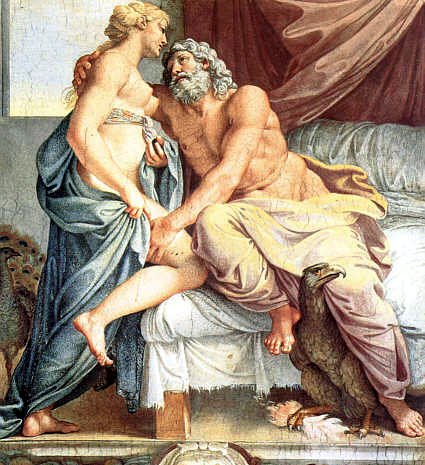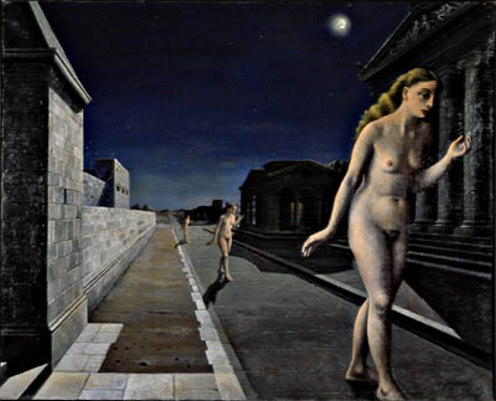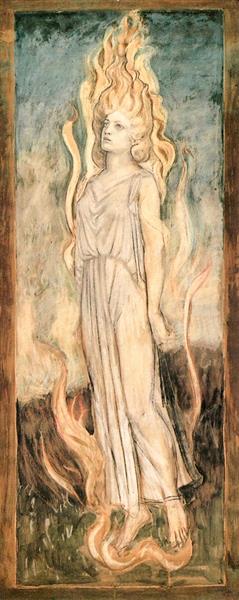Richibi’s Weblog
Category: poetry
November 13, 2021
would not protect the soft and lovely boy,
Its verdant head, and a new Spring appears.
August 22, 2021
“The Mariners transform’d to Dolphins” – Ovid
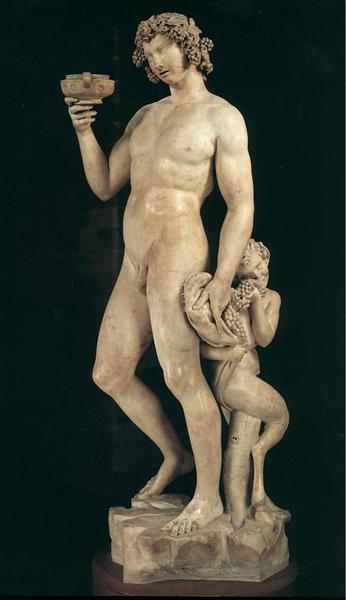
“Bacchus” (1497)
Michelangelo
_______
Him Pentheus view’d with fury in his look,
Pentheus, king of Thebes, if you’ll
remember, after Cadmus, his
grandfather, founder of Thebes
viewed, scanned, surveyed
And scarce with-held his hands, whilst thus he spoke:
with-held, withheld
“Vile slave! whom speedy vengeance shall pursue,
And terrify thy base seditious crew:
Vile slave, the zealous votary from
the last instalment, follower, acolyte
of Bacchus / Dionysus, who’d been
captured by Pentheus’ men instead
of the god himself
by exacting a speedy vengeance on
this [v]ile slave, Pentheus expects
to terrify the remaining elements of
the offending crew, the seditious
party of Bacchus / Dionysus
Thy country and thy parentage reveal,
And, why thou joinest in these mad Orgies, tell.”
where are you from, what are you
doing here, Pentheus asks
The captive views him with undaunted eyes,
And, arm’d with inward innocence, replies,
“From high Meonia’s rocky shores I came,
Of poor descent, Acoetes is my name:
My sire was meanly born; no oxen plow’d
His fruitful fields, nor in his pastures low’d.
meanly, poor, without adequate
means
plow’d, low’d, an interesting
rhyme, they’re called forced
or oblique rhymes
His whole estate within the waters lay;
estate, livelihood, Acoetes‘ father,
his sire, was a fisherman
With lines and hooks he caught the finny prey,
finny, having fins
His art was all his livelyhood; which he
Thus with his dying lips bequeath’d to me:
His art, the quality of his work
In streams, my boy, and rivers take thy chance;
There swims, said he, thy whole inheritance.
Acoetes will inherit at best his
father’s skill
Long did I live on this poor legacy;
‘Till tir’d with rocks, and my old native sky,
that of Meonia, see above
To arts of navigation I inclin’d;
arts of navigation, knowledge of
the open sea, the wider oceans
Observ’d the turns and changes of the wind,
Learn’d the fit havens, and began to note
The stormy Hyades, the rainy Goat,
The bright Taygete, and the shining Bears,
With all the sailor’s catalogue of stars.
Hyades, a cluster of stars, with their
own mythic origin story, grieving
nymphs cast upon the heavens,
augurs of rain,hence stormy
the rainy Goat, Capricornus, the
constellation
Taygete, a satellite of the planet
the shining Bears, Ursa Major
and Ursa Minor, or the Great
and the Little Bear, whose
origins you might remember
from The Story of Calisto
“Once, as by chance for Delos I design’d,
Delos, a Greek island
design’d, planned as a destination
My vessel, driv’n by a strong gust of wind,
Moor’d in a Chian Creek; a-shore I went,
Chian, of Chios, a Greek island
And all the following night in Chios spent.
When morning rose, I sent my mates to bring
Supplies of water from a neighb’ring spring,
Whilst I the motion of the winds explor’d;
Then summon’d in my crew, and went aboard.
Opheltes heard my summons,
Opheltes, a confederate apparently
and with joy
Brought to the shore a soft and lovely boy,
With more than female sweetness in his look,
hmmmm
Whom straggling in the neighb’ring fields he took.
he took, he apprehended
With fumes of wine the little captive glows,
And nods with sleep, and staggers as he goes.
“I view’d him nicely, and began to trace
Each heav’nly feature, each immortal grace,
And saw divinity in all his face,
I know not who, said I, this God should be;
But that he is a God I plainly see:
And thou, who-e’er thou art, excuse the force
These men have us’d; and oh befriend our course!
befriend, accord it your sympathy
Pray not for us, the nimble Dictys cry’d,
Dictys, one of Acoetes‘ shipmates
Dictys, that could the main-top mast bestride,
And down the ropes with active vigour slide.
To the same purpose old Epopeus spoke,
Epopeus, another sailor
Who over-look’d the oars, and tim’d the stroke;
The same the pilot, and the same the rest;
Such impious avarice their souls possest.
all countermanding Acoetes‘, however
discerning, assessment
Nay, Heav’n forbid that I should bear away
Within my vessel so divine a prey,
Said I; and stood to hinder their intent:
Acoetes had no intention of confining
this so divine a prey to his ship
When Lycabas, a wretch for murder sent
From Tuscany, to suffer banishment,
With his clench’d fist had struck me over-board,
Had not my hands in falling grasp’d a cord.
Lycabas, a third shipmate
Tuscany, a region of what is now
central Italy
it appears, however, that Acoetes
lived to tell the tale
stay tuned
R ! chard
July 24, 2021
“The Story of Pentheus” – Ovid

“The Triumphal Procession of Bacchus” (c.1536)
Maerten van Heemskerck
_______________
till now the separate stories in Ovid’s
Metamorphoses have been linked,
one being either a consequence of
the other,or its cause, but the story
of Pentheus, grandson of Cadmus,
king and founder of Thebes, who
earlier in this series had his own
tale told, starts, as my German
teacher used to say, from the
scratch
This sad event, therefore, in the
first line of the poem, refers to
what will follow, not what came
before
This sad event gave blind Tiresias fame,
Through Greece establish’d in a prophet’s name.
Tiresias, if you’ll remember, had been
blinded by Juno / Hera, goddess of the
gods, for having sided with Jove / Jupiter
/ Zeus, her husband, in a wager between
them he’d been called upon to decide,
Jove / Jupiter / Zeus, however, gave
Tiresias, as consolation, having been
barred by a pact among the gods not
to undo each other’s spells, the gift
of insight, prophecy
the example that follows, of his divination,
establish[‘d] at that time his reputation
[t]hrough[out] Greece as a prophet
Th’ unhallow’d Pentheus only durst deride
The cheated people, and their eyeless guide.
unhallow’d, unholy, wicked, sinful
Pentheus, king of Thebes following
his grandfather, Cadmus, but that’s
an entirely other story
only, of all the people, none but
Pentheus durst, dared, deride,
mock, their eyeless guide, Tiresias
To whom the prophet in his fury said,
Shaking the hoary honours of his head:
hoary, grizzled, gray, aged
“‘Twere well, presumptuous man, ’twere well forthee
If thou wert eyeless too, and blind, like me:
For the time comes, nay, ’tis already here,
When the young God’s solemnities appear:
the young God[], Bacchus / Dionysus,
son of Semele and Jove / Jupiter / Zeus,
if you’ll remember, god of revelry,
intoxication, wild abandon
Which, if thou dost not with just rites adorn,
Thy impious carcass, into pieces torn,
Shall strew the woods, and hang on ev’ry thorn.
impious carcass, dishonoured corpse,
of any thou who wouldn’t’ve honoured
the celebrations
Then, then, remember what I now foretel,
And own the blind Tiresias saw too well.”
own, agree to, admit
Still Pentheus scorns him, and derides his skill;
But time did all the prophet’s threats fulfil.
For now through prostrate Greece young Bacchus rode,
prostrate, beholden, reverent, observant
of the solemnities
Whilst howling matrons celebrate the God:
All ranks and sexes to his Orgies ran,
To mingle in the pomps, and fill the train.
the rites of Bacchus were bacchanals,
orgies, celebrations of abandon, Mardi
Gras, for instance, in New Orleans,
annual Gay Parades, now everywhere,
or Hallowe’en since time immemorial
see above
When Pentheus thus his wicked rage express’d:
“What madness, Thebans, has your souls possess’d?
Can hollow timbrels, can a drunken shout,
timbrels, tambourines
And the lewd clamours of a beastly rout,
Thus quell your courage;
quell your courage, overcome your
sense of discipline
can the weak alarm
Of women’s yells those stubborn souls disarm,
those stubborn souls, the Theban
spirit of pride and honour
Whom nor the sword nor trumpet e’er could fright,
Nor the loud din and horror of a fight?
And you, our sires, who left your old abodes,
our sires, the older generation of
Thebans, of his grandfather
Cadmus‘ ilk
And fix’d in foreign earth your country Gods;
foreign earth, very Thebes, from Tyre,
where Cadmus and his followers had
come from, in search of Europa, if
you’ll remember
Will you without a stroak your city yield,
stroak, stroke
And poorly quit an undisputed field?
undisputed field, there are no
military obstructions
But you, whose youth and vigour should inspire
Heroick warmth, and kindle martial fire,
Whom burnish’d arms and crested helmets grace,
Not flow’ry garlands and a painted face;
Remember him to whom you stand ally’d:
him, Pentheus himself, their king
The serpent for his well of waters dy’d.
The serpent, a reference here to the
dragon that Cadmus slew, which had
guarded the cavern where his crew
had been scouting for water, if you’ll
remember
He fought the strong; do you his courage show,
And gain a conquest o’er a feeble foe.
a feeble foe, licentiousness, abandon,
undisciplined revelry
If Thebes must fall, oh might the fates afford
A nobler doom from famine, fire, or sword.
Pentheus appeals to a loftier reason
for defeat, famine, fire, or sword, than
mere, and ignoble, debauchery
Then might the Thebans perish with renown:
But now a beardless victor sacks the town;
beardless victor, the young Bacchus /
Dionysus
Whom nor the prancing steed, nor pond’rous shield,
Nor the hack’d helmet, nor the dusty field,
But the soft joys of luxury and ease,
The purple vests, and flow’ry garlands please.
Bacchus / Dionysus is not impressed
by armour, military accomplishments,
prowess, but by grace, elegance, and
poetry
Stand then aside, I’ll make the counterfeit
Renounce his god-head, and confess the cheat.
the counterfeit, Bacchus / Dionysus
Acrisius from the Grecian walls repell’d
This boasted pow’r; why then should Pentheus yield?
Acrisius, a king of Argos, who must’ve
also repell’d from his city Bacchus /
Dionysus, according to the poem
Go quickly drag th’ impostor boy to me;
th’ impostor boy, the counterfeit,
Bachus / Dionysus
I’ll try the force of his divinity.”
try, test
Thus did th’ audacious wretch those rites profane;
th’ audacious wretch, Pentheus
His friends dissuade th’ audacious wretch in vain:
In vain his grandsire urg’d him to give o’er
His impious threats; the wretch but raves the more.
his grandsire, Cadmus
So have I seen a river gently glide,
In a smooth course, and inoffensive tide;
But if with dams its current we restrain,
It bears down all, and foams along the plain.
nature will have its way, so will the
gods, watch out, the narrator says,
who it is that you challenge
But now his servants came besmear’d with blood,
Sent by their haughty prince to seize the God;
his servants, Pentheus‘ men
the God, Bacchus / Dionysus
The God they found not in the frantick throng,
But dragg’d a zealous votary along.
votary, follower, adherent,
acolyte
the servants, Pentheus‘ men,
who did not, apparently, deliver
stay tuned
R ! chard
July 9, 2021
“The Story of Narcissus” (lll) – Ovid
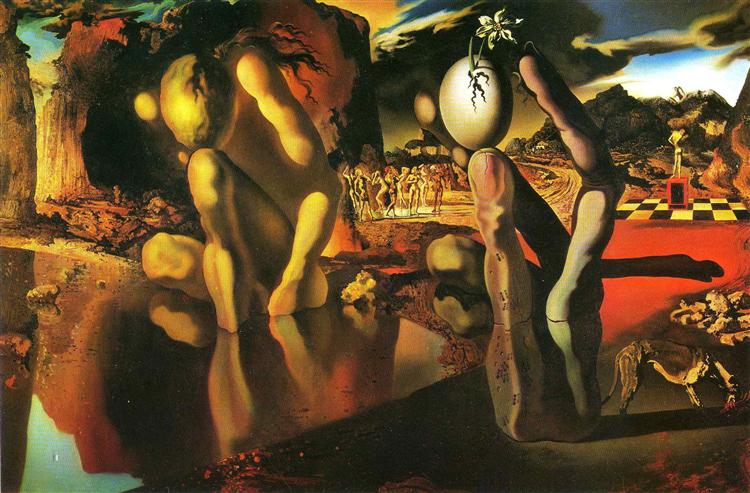
“The Metamorphosis of Narcissus” (1937)
Salvador Dali
_____
This said, the weeping youth again return’d
To the clear fountain,
This said, you’ll remember that Narcissus
had pondered suicide, but was afraid that
such an act would also have an impact on
his reflection
where again he burn’d;
burn’d, from the unusual fire that kindled
his breast
His tears defac’d the surface of the well,
With circle after circle, as they fell:
disfiguring reverberations in the water
from the tears
And now the lovely face but half appears,
O’er-run with wrinkles, and deform’d with tears.
“Ah whither,” cries Narcissus, “dost thou fly?
Let me still feed the flame by which I die;
the flame by which I die, the fire which
burns in his chest
Let me still see, tho’ I’m no further blest.”
Narcissus will not willingly forego the
sight of his reflection though it will
manifestly not at all still his desire,
nor quell his fate
Then rends his garment off, and beats his breast:
His naked bosom redden’d with the blow,
In such a blush as purple clusters show,
Ere yet the sun’s autumnal heats refine
Their sprightly juice, and mellow it to wine.
bruises the colour of wine blush in
purple clusters on his chest where
Narcissus has struck himself
repeatedly
The glowing beauties of his breast he spies,
And with a new redoubled passion dies.
The glowing beauties, the throbbing
discolorations left by the redoubled
blows
As wax dissolves, as ice begins to run,
And trickle into drops before the sun;
So melts the youth, and languishes away,
His beauty withers, and his limbs decay;
And none of those attractive charms remain,
To which the slighted Echo su’d in vain.
slighted, rebuffed
Echo, the nymph who’d pursued him,
in vain, if you’ll remember
su’d, sued, implored
She saw him in his present misery,
Whom, spight of all her wrongs, she griev’d to see.
spight, in spite
She answer’d sadly to the lover’s moan,
Sigh’d back his sighs, and groan’d to ev’ry groan:
“Ah youth! belov’d in vain,” Narcissus cries;
to his reflection
“Ah youth! belov’d in vain,” the nymph replies.
Echo can only echo
“Farewel,” says he; the parting sound scarce fell
From his faint lips, but she reply’d, “farewel.”
Narcissus, interestingly, is reproduced
not only visually in the water by his
own reflection, but audibly as well by
Echo‘s reverberating sounds
Then on th’ wholsome earth he gasping lyes,
‘Till death shuts up those self-admiring eyes.
To the cold shades his flitting ghost retires,
And in the Stygian waves it self admires.
Stygian, of the river Styx, which forms
the boundary between Earth and the
Underworld
For him the Naiads and the Dryads mourn,
Naiads, water nymphs
Dryads, tree nymphs
Whom the sad Echo answers in her turn;
Echo also mourns
And now the sister-nymphs prepare his urn:
When, looking for his corps, they only found
A rising stalk, with yellow blossoms crown’d.
corps, corpse, dead body
rising stalk, with yellow blossoms
crown’d, the narcissus, the flower
R ! chard
June 13, 2021
“The Story of Narcissus” (ll) – Ovid
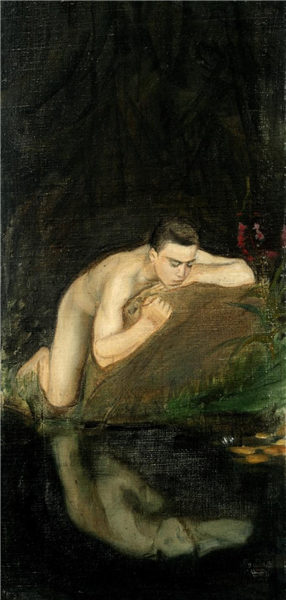
“Narcissus” (1896 – 1897)
Magnus Enckell
__________
Still o’er the fountain’s wat’ry gleam he stood,
Mindless of sleep, and negligent of food;
Still view’d his face, and languish’d as he view’d.
Narcissus has been smitten by this
reflection of himself in the fountain’s
wat’ry gleam, can’t sleep, won’t eat
note, incidentally, the two meanings
of Still here, the first, without moving,
the second, not having stopped, not
discontinued
At length he rais’d his head, and thus began
To vent his griefs, and tell the woods his pain.
“You trees,” says he, “and thou surrounding grove,
Who oft have been the kindly scenes of love,
Tell me, if e’er within your shades did lye
A youth so tortur’d, so perplex’d as I?
I, who before me see the charming fair,
the charming fair, his reflection
in the fountain’s wat’ry gleam
Whilst there he stands, and yet he stands not there:
In such a maze of love my thoughts are lost:
Narcissus reflects, bewildered
by the ephemerality of his
vision
And yet no bulwark’d town, nor distant coast
Preserves the beauteous youth from being seen,
No mountains rise, nor oceans flow between.
there is no material object, he reasons,
to obstruct a clear view of the beauteous
youth before him, no intervening
obstacles between him and his vision
bulwark’d, defended with fortifications,
as in Medieval towns
the beauteous youth, his own reflection
A shallow water hinders my embrace;
A shallow water, only a sheen is
required to cast a reflection, a
film merely, the water need not
be at all that deep
And yet the lovely mimick wears a face
the lovely mimick, the image in
the water
That kindly smiles, and when I bend to join
My lips to his, he fondly bends to mine.
what of homosexuality here, an
unobjectionable predilection at
the time, apparently, there isn’t
a whiff of iniquity in this attraction,
according to the text, no hint of
guilt or embarrassment
Hear, gentle youth, and pity my complaint,
a direct exhortation here, note,
no longer, in this instance, a
literary narration, a tale being
told
Come from thy well, thou fair inhabitant.
My charms an easy conquest have obtain’d
O’er other hearts, by thee alone disdain’d.
you, Narcissus says, alone, replication,
disdain[ ], repulse, my advances, my
elsewhere, otherwise, easy conquest[s]
But why should I despair? I’m sure he burns
With equal flames, and languishes by turns.
When-e’er I stoop, he offers at a kiss,
offers, responds with
And when my arms I stretch, he stretches his.
His eye with pleasure on my face he keeps,
He smiles my smiles, and when I weep he weeps.
When e’er I speak, his moving lips appear
To utter something, which I cannot hear.
all his senses are alive, but for
his hearing, which registers only
silence, when all of the other
aspects of the experience are
precise and vivid as though
real, utterly, however
incompatibly, convincing
“Ah wretched me! I now begin too late
To find out all the long-perplex’d deceit;
It is my self I love, my self I see;
The gay delusion is a part of me.
I kindle up the fires by which I burn,
And my own beauties from the well return.
Whom should I court? how utter my complaint?
court, sue to, argue, put to the
test a dilemma, a complaint, as
though before an arbiter
Enjoyment but produces my restraint,
And too much plenty makes me die for want.
How gladly would I from my self remove!
And at a distance set the thing I love.
My breast is warm’d with such unusual fire,
I wish him absent whom I most desire.
And now I faint with grief; my fate draws nigh;
In all the pride of blooming youth I die.
the contradictions inherent in passion
are evidenced, in this case those of
love
Death will the sorrows of my heart relieve.
Oh might the visionary youth survive,
visionary, relating to vision, observed,
caught sight of, viewed, in the water
relieve, render solace to, there is no
solution to this anguished misery
but dying
I should with joy my latest breath resign!
But oh! I see his fate involv’d in mine.”
you might have noted, or not, that
the tale has become psychological
in the instance of Narcissus, where
earlier an action transpired and
events were recounted in
chronological order, in this myth,
the subject explores his inner
world while sitting quietly
throughout by the still water,
nothing moves, but the
palpitations of his heart, and its
distempers
there’s a shift here in not only
the mythological template, more
personal, individual stuff, but also
in the very evolution of literature,
which takes on a more interior
tone rather than fatalistic,
episodic, given entirely to
unfathomed circumstance
this will lead to To be, or not to be
eventually, the anthem that took
over the subsequent centuries
since, Shakespeare‘s homage to
introspection, setting the stage
for the ensuing ages of
individualism, human rights
but that’s another story
stay tuned
R ! chard
May 7, 2021
Ovid / Shakespeare
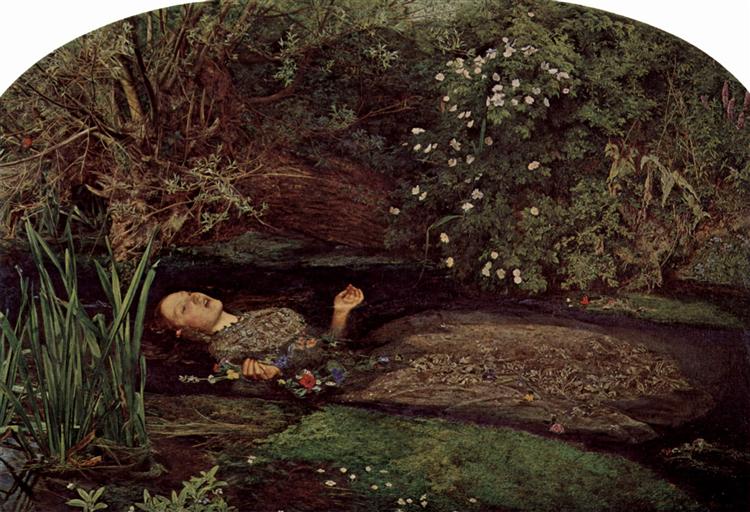
“Ophelia” (1851 – 1852)
John Everett Millais
_________
for a while now, I’ve been feeling the
spirit of Ovid in many of the works of
William Shakespeare, a recent, in
some depth, project of mine, the
nearly pagan perspective in many
of his works, a lust for life, for
instance, that is not at all that of his
contemporary Protestantism, not
to mention an obvious Catholic, and
therefore potentially treacherous, at
the time, prominent bent of his
but that’s another story
many of his plays set scenes in places
right out of Roman mythology, with a
morality to match,and even character
names, Hippolyta, Hero, Polonius,
Titania, Oberon, Greek and Latin
patronyms redolent of Classical
Antiquity
here’s Ovid, for instance, from “The
Story of Narcissus”
There stands a fountain in a darksom wood,
Nor stain’d with falling leaves nor rising mud;
Untroubled by the breath of winds it rests,
Unsully’d by the touch of men or beasts;
High bow’rs of shady trees above it grow,
And rising grass and chearful greens below.
here’s Shakespeare, from his Hamlet,
Gertrude, Queen of Denmark, gives
the news of Ophelia’s death, in a
particularly Ovidian, I think, manner
There is a willow grows aslant a brook,
That shows his hoar leaves in the glassy stream;
There with fantastic garlands did she come
Of crow-flowers, nettles, daisies, and long purples
That liberal shepherds give a grosser name,
But our cold maids do dead men’s fingers call them:
There, on the pendent boughs her coronet weeds
Clambering to hang, an envious sliver broke;
When down her weedy trophies and herself
Fell in the weeping brook. Her clothes spread wide;
And, mermaid-like, awhile they bore her up:
Which time she chanted snatches of old tunes;
As one incapable of her own distress,
Or like a creature native and indued
Unto that element: but long it could not be
Till that her garments, heavy with their drink,
Pull’d the poor wretch from her melodious lay
To muddy death.
see above
there is the influence of Dryden to
consider, it must be noted, Ovid‘s
translator into English, but the
similarity in the spirit of the text is
so great, the characteristic voice
so evident, regardless of elapsed
time, the intervening fifteen hundred
years, 8 CE for Ovid, to somewhere
around 1600 CE for Shakespeare,
for the congruence to be coincidental,
Shakespeare had to have been reading
his Ovid, imbibing it, what, do you think
then again, as Shakespeare would
have said, There are more things in
heaven and earth, Horatio, / Than
are dreamt of in your philosophy
R ! chard
May 1, 2021
“The Story of Narcissus” – Ovid
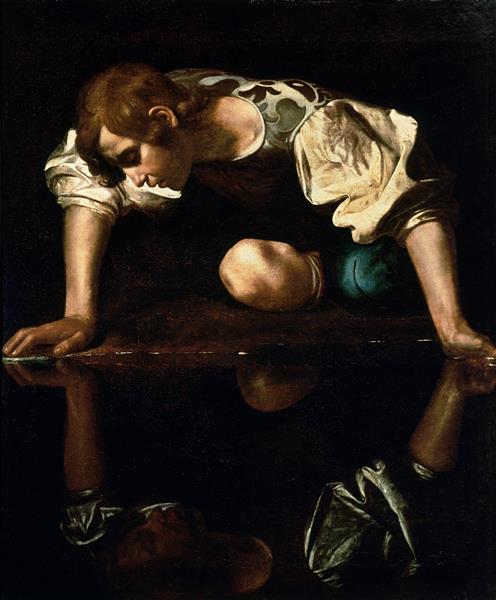
“Narcissus” (c.1599)
Caravaggio
______
Thus did the nymphs in vain caress the boy,
the boy, Narcissus
in vain , Narcissus‘ pride, you’ll remember,
was such that love-sick maid[s] uselessly
[their] flame confess’d, Narcissus was
oblivious to their advances
He still was lovely, but he still was coy;
When one fair virgin of the slighted train
slighted train, row of followers, love-sick
maid[s] who’d been spurned by Narcissus
Thus pray’d the Gods, provok’d by his disdain,
provok’d by his disdain, angered by his
rejection
“Oh may he love like me, and love like me in vain!”
beseeches the one fair virgin
Rhamnusia pity’d the neglected fair,
Rhamnusia, goddess of Retribution,
also known as Nemesis
And with just vengeance answer’d to her pray’r.
just vengeance, justified retribution
There stands a fountain in a darksom wood,
Nor stain’d with falling leaves nor rising mud;
Untroubled by the breath of winds it rests,
Unsully’d by the touch of men or beasts;
High bow’rs of shady trees above it grow,
And rising grass and chearful greens below.
bow’rs, enclosures among trees
greens, lawns, grasslands
Pleas’d with the form and coolness of the place,
And over-heated by the morning chace,
Narcissus on the grassie verdure lyes:
verdure, greenness
But whilst within the chrystal fount he tries
To quench his heat, he feels new heats arise.
chrystal fount, glistening fountain,
or spring
For as his own bright image he survey’d,
He fell in love with the fantastick shade;
shade, apparition, illusion
And o’er the fair resemblance hung unmov’d,
see above
Nor knew, fond youth! it was himself he lov’d.
The well-turn’d neck and shoulders he descries,
descries, espies, catches sight of
The spacious forehead, and the sparkling eyes;
The hands that Bacchus might not scorn to show,
Bacchus, god of Wine and Revelry, also
known as Dionysus
And hair that round Apollo’s head might flow;
Apollo, god of the Sun
With all the purple youthfulness of face,
That gently blushes in the wat’ry glass.
wat’ry glass, the chrystal fount
By his own flames consum’d the lover lyes,
And gives himself the wound by which he dies.
the wound, the sight of himself
dies, succumbs, is undone
To the cold water oft he joins his lips,
Oft catching at the beauteous shade he dips
His arms,
shade, see above
as often from himself he slips.
slips, becomes abstracted, bewildered
Nor knows he who it is his arms pursue
With eager clasps, but loves he knows not who.
he cannot give substance to this illusion
What could, fond youth, this helpless passion move?
What kindled in thee this unpity’d love?
move, excite, indeed kindle[]
Thy own warm blush within the water glows,
the poet, here, note, interjects, speaks
directly to Narcissus
With thee the colour’d shadow comes and goes,
colour’d, because of the water, an exact
replication, even chromatically, but
shimmering, com[ing] and go[ing]
shadow, shade, see above, reflection
Its empty being on thy self relies;
empty being, fabrication, imagined
construct
on thy self relies, you are yourself
the source of your illusion
Step thou aside, and the frail charmer dies.
frail charmer, shimmering, insubstantial
illusion
stay tuned
R ! chard
April 26, 2021
“The Transformation of Echo” – Ovid
“Echo” (1943)
Paul Delvaux
_______
Fam’d far and near for knowing things to come,
From him th’ enquiring nations sought their doom;
him, Tiresias, the prophet, if you’ll
remember
their doom, their auguries, their
fates, their destinies
The fair Liriope his answers try’d,
Liriope, a water nymph, a naiad
And first th’ unerring prophet justify’d.
justify’d, gave credence to, believed
This nymph the God Cephisus had abus’d,
Cephisus, a river god
With all his winding waters circumfus’d,
circumfus’d, surrounded, enveloped
And on the Nereid got a lovely boy,
the Nereid, Liriope, daughter of Nereus,
god of the Sea, in Dryden’s, inaccurate
however, translation of Ovid, Liriope is,
rather, a fresh water nymph, a naiad,
not listed among the fifty, fifty, I say,
daughters of Nereus, the Nereids,
sea nymphs
Whom the soft maids ev’n then beheld with joy.
soft maids, sister, the other 49,
presumably, Nereids
The tender dame, sollicitous to know
Whether her child should reach old age or no,
Consults the sage Tiresias, who replies,
“If e’er he knows himself he surely dies.”
The tender dame, Liriope
“If e’er he knows himself he surely dies.”,
typically cryptically for a prophecy, see,
for instance, your daily horoscope
Long liv’d the dubious mother in suspence,
‘Till time unriddled all the prophet’s sense.
in the depth of time, all is revealed
Narcissus now his sixteenth year began,
Narcissus, son, however illicit, of
Liriope and Cephisus
Just turn’d of boy, and on the verge of man;
Many a friend the blooming youth caress’d,
Many a love-sick maid her flame confess’d:
I’ve noted that beautiful people are
pursued by men and women, be
that beautiful person either a man
or a woman, a situation they have
to ever undergo, if not even endure
Such was his pride, in vain the friend caress’d,
The love-sick maid in vain her flame confess’d.
pride, independence, personal
distance
Once, in the woods, as he pursu’d the chace,
The babbling Echo had descry’d his face;
Echo, a mountain nymph
babbling, like water rippling
descry’d, espied, caught sight of
She, who in others’ words her silence breaks,
who can only speak when others have
spoken
Nor speaks her self but when another speaks.
Echo‘s curse since time immemorial
Echo was then a maid, of speech bereft,
bereft, deprived
Of wonted speech;
wonted, usual, habitual, ordinary
for tho’ her voice was left,
Juno a curse did on her tongue impose,
To sport with ev’ry sentence in the close.
To sport with, have fun with
in the close, at the end
Full often when the Goddess might have caught
Jove and her rivals in the very fault,
the Goddess, Juno / Hera, wife of
Jove / Jupiter / Zeus, God of gods
This nymph with subtle stories would delay
Her coming, ’till the lovers slip’d away.
it is interesting to note that not only
Echo, but any, in such a culture of
many gods, would’ve had to choose
among them, despite their, however
divine, individual inconsistencies,
to the sure detriment of any mortal
caught in the middle, personal guilt
wouldn’t’ve been as foundational a
driving element, therefore, in such
a culture as it would be under
monotheistic religions, where the
moral path is categorically ordained,
specifically determined, as in, for
instance, the Ten Commandments,
but Fate, rather, or the will of the
gods, however frivolous, plays a
much larger role there, we are
putty in this alternate theological
universe, in the hands of
essentially disinterested deities
The Goddess found out the deceit in time,
The Goddess, Juno / Hera, wife of
Jove / Jupiter / Zeus, God of gods
And then she cry’d, “That tongue, for this thy crime,
Which could so many subtle tales produce,
Shall be hereafter but of little use.”
one would think that Jove / Jupiter /
Zeus, the instigator, might’ve had
something to say about that, though
the challenger be his wife, but he
doesn’t
Hence ’tis she prattles in a fainter tone,
With mimick sounds, and accents not her own.
a mere shadow of her former self
see above
This love-sick virgin, over-joy’d to find
The boy alone, still follow’d him behind:
the pining of a woman for a man
without moral judgment in a
theological text is radical in our
monotheistic tradition, where
lust, voluptuousness, in either
direction, have been the work
of the Devil, not the natural
inclination, brought on by very
springtime, instinctive, rather
than premeditated or predatory,
that more pantheistic belief
systems present
When glowing warmly at her near approach,
As sulphur blazes at the taper’s touch,
She long’d her hidden passion to reveal,
long’d, desired, hoped, wished for
And tell her pains, but had not words to tell:
She can’t begin, but waits for the rebound,
To catch his voice, and to return the sound.
Echo cannot voice, begin, her own
words, sentences, needs an already
vocalized statement, a prompt, in
order to utter whatever, is therefore,
before Narcissus, her intended, her
desired, ever mute
The nymph, when nothing could Narcissus move,
Still dash’d with blushes for her slighted love,
dash’d, undone, thrown asunder
Liv’d in the shady covert of the woods,
In solitary caves and dark abodes;
Where pining wander’d the rejected fair,
or Where the rejected fair, Echo,
wander’d pining
Till harrass’d out, and worn away with care,
The sounding skeleton, of blood bereft,
sounding skeleton, reverberating
remains, resonating essence
see, again, above
Besides her bones and voice had nothing left.
Echo, the entity itself, herself,
barren, indeed bereft
Her bones are petrify’d, her voice is found
In vaults, where still it doubles ev’ry sound.
listen, you’ll hear it, despite the
intervening centuries
R ! chard
March 26, 2021
“The Transformation of Tiresias” – Ovid
